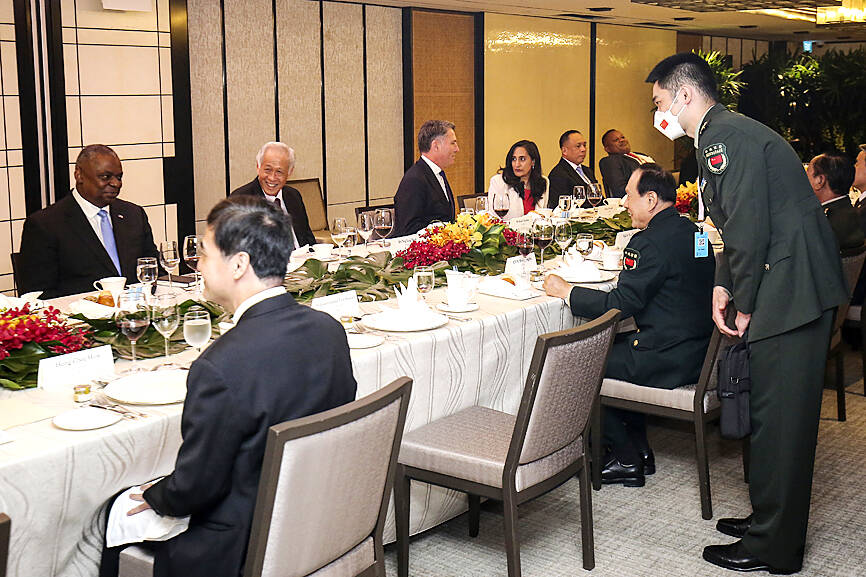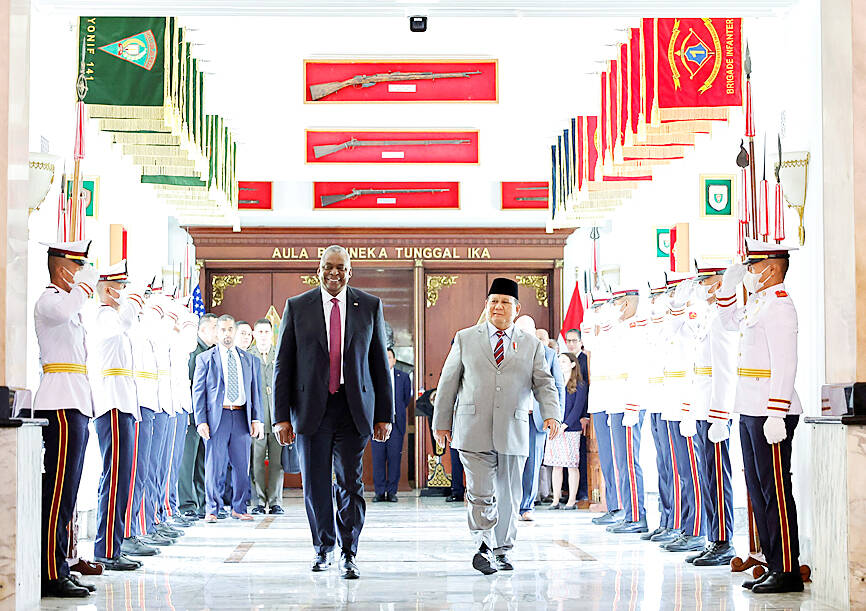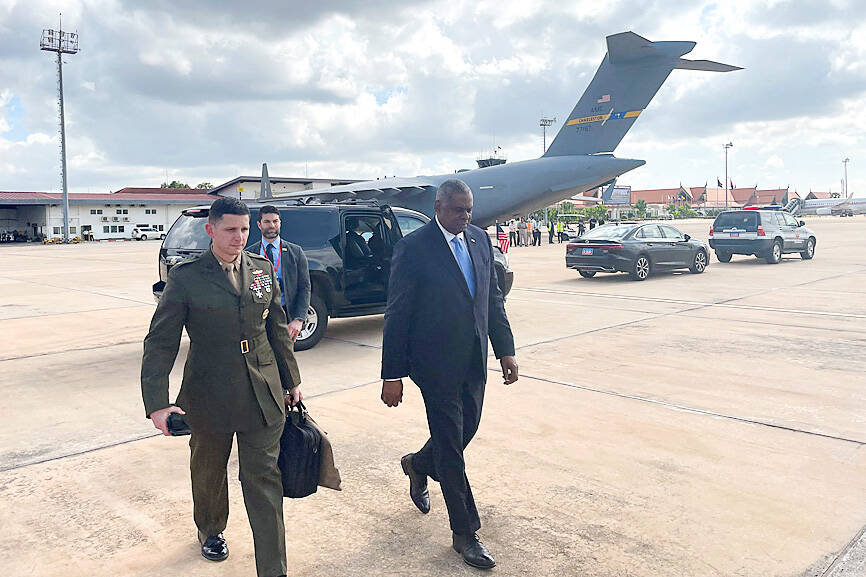China has noted the international response to Russia’s invasion of Ukraine and could take steps to protect itself from a similar rebuke stemming from a more aggressive posture toward Taiwan, US Secretary of Defense Lloyd Austin said on Wednesday.
“You have to believe that they’re thinking along those lines, if they were considering doing something in the future,” Austin told reporters shortly after he left Cambodia, where he attended a series of meetings with ASEAN defense ministers.
He said he had not “seen any physical signs of them insulating themselves.”

Photo: AP
Asked if he anticipated Pacific Rim nations would rally to Taiwan’s side if China were to launch an invasion, Austin said allies’ respect for the rules-based international order “will lead them in whatever direction they go in, and not just allegiance to the United States.”
US President Joe Biden has said Washington would defend Taiwan militarily from a Chinese attack — remarks that prompted Beijing to increase pressure on Taiwan following a visit to Taipei by US House of Representatives Speaker Nancy Pelosi in August.
Biden and Chinese President Xi Jinping (習近平) in Indonesia last week held their first in-person meeting since Biden assumed office, a session aimed at putting the US-China relationship on a more stable footing.

Photo: REUTERS
Still, China remains a “challenge” for the US and is likely already working to safeguard its economy and supply chains against sanctions allies would impose if it tries to invade Taiwan.
“China is our basic challenge. We don’t call them a threat, we call them a challenge. That’s the relationship that we believe we have,” Austin said. “We have a competitive relationship and not a contentious relationship.”
Austin met with Chinese Minister of National Defense General Wei Fenghe (魏鳳和) in Siem Reap, Cambodia, on Tuesday, the first face-to-face meeting between the two since Pelosi’s visit to Taipei.

Photo: AFP
The Pentagon chief called for the two sides to keep their lines of communication open and warned of “increasingly dangerous behavior” by Chinese military aircraft in the Indo-Pacific region, according to a statement and briefing by US officials after the meeting.
US forces are “spending a lot more time” training in Asia, for military exercises such as Garuda Shield, Austin said.
“Our troops want to train with allies and partners. They want to develop interoperability,” he said.
Austin described his meetings with officials from China, India, the Philippines and other nations on the sidelines of the ASEAN gathering as “very productive.”
“This is a big area, a vast area and it supports a lot of commerce,” he said. “We want to make sure that the skies and seas remain open and accessible to everybody in the region and around the globe.”

CHAOS: Iranians took to the streets playing celebratory music after reports of Khamenei’s death on Saturday, while mourners also gathered in Tehran yesterday Iranian Supreme Leader Ayatollah Ali Khamenei was killed in a major attack on Iran launched by Israel and the US, throwing the future of the Islamic republic into doubt and raising the risk of regional instability. Iranian state television and the state-run IRNA news agency announced the 86-year-old’s death early yesterday. US President Donald Trump said it gave Iranians their “greatest chance” to “take back” their country. The announcements came after a joint US and Israeli aerial bombardment that targeted Iranian military and governmental sites. Trump said the “heavy and pinpoint bombing” would continue through the week or as long

TRUST: The KMT said it respected the US’ timing and considerations, and hoped it would continue to honor its commitments to helping Taiwan bolster its defenses and deterrence US President Donald Trump is delaying a multibillion-dollar arms sale to Taiwan to ensure his visit to Beijing is successful, a New York Times report said. The weapons sales package has stalled in the US Department of State, the report said, citing US officials it did not identify. The White House has told agencies not to push forward ahead of Trump’s meeting with Chinese President Xi Jinping (習近平), it said. The two last month held a phone call to discuss trade and geopolitical flashpoints ahead of the summit. Xi raised the Taiwan issue and urged the US to handle arms sales to

BIG SPENDERS: Foreign investors bought the most Taiwan equities since 2005, signaling confidence that an AI boom would continue to benefit chipmakers Taiwan Semiconductor Manufacturing Co’s (TSMC, 台積電) market capitalization swelled to US$2 trillion for the first time following a 4.25 percent rally in its American depositary receipts (ADR) overnight, putting the world’s biggest contract chipmaker sixth on the list of the world’s biggest companies by market capitalization, just behind Amazon.com Inc. The site CompaniesMarketcap.com ranked TSMC ahead of Saudi Aramco and Meta Platforms Inc. The Taiwanese company’s ADRs on Tuesday surged to US$385.75 on the New York Stock Exchange, as strong demand for artificial intelligence (AI) applications led to chip supply constraints and boost revenue growth to record-breaking levels. Each TSMC ADR represents

State-run CPC Corp, Taiwan (CPC, 台灣中油) yesterday said that it had confirmed on Saturday night with its liquefied natural gas (LNG) and crude oil suppliers that shipments are proceeding as scheduled and that domestic supplies remain unaffected. The CPC yesterday announced the gasoline and diesel prices will rise by NT$0.2 and NT$0.4 per liter, respectively, starting Monday, citing Middle East tensions and blizzards in the eastern United States. CPC also iterated it has been reducing the proportion of crude oil imports from the Middle East and diversifying its supply sources in the past few years in response to geopolitical risks, expanding